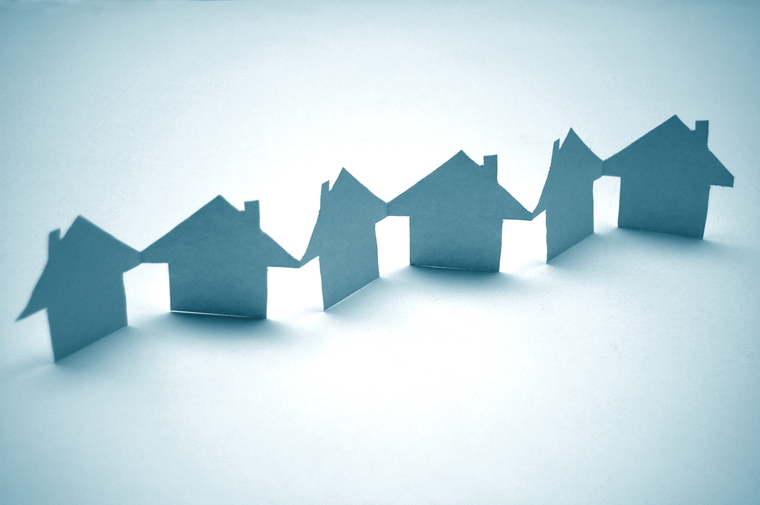The Importance of Pre-Approval

To set yourself up for a smooth and successful home purchase, getting pre-approved is perhaps the most productive first step you can take. It strengthens your buying credibility, informs your home search, and speeds up the closing process.
The Pre-Approval Process
There is an important distinction to made between two important steps of your mortgage application process: pre-qualification and pre-approval. They are similar in that they both help to inform your financial standing, but there are key differences between the two.
Pre-qualification
Pre-qualification is the first step in your mortgage application process. It will help you to understand the approximate loan amount you can expect to qualify for. You’ll begin by sharing your financial information—debt, income, assets, etc.—with you bank or lender. After reviewing the information, the bank or lender will give a loan estimate. The process is relatively simple, only taking a few business days to process.
Pre-approval
The pre-approval process is more involved than pre-qualification. After submitting a mortgage application, your lender will require all the necessary info to conduct a thorough credit history check and review of your financial health. Getting pre-approved will give you a better idea of how much you can borrow, estimated monthly costs, and what interest rates you can expect on your loans. Mortgage pre-approvals are typically valid for 60 to 90 days.
Benefits of Pre-Approval
Credibility
The truth is, each home on the market can only go to one buyer. To maximize the chance that your offer is accepted, sellers need to know that your offer is serious. Getting pre-approved shows that you are financially prepared and, in the event that your offer is accepted, there will be no hold ups in obtaining your mortgage. This assurance is what sellers want to know about their potential buyers, especially in a seller’s market.
Home search
Not only does pre-approval help to bolster your case as a buyer, but it also Indicates your affordable price range. By knowing your budget, you will be able to hone your home search and start preparing offers, eliminating any potential wasted time looking at houses you can’t afford.
Closing process
Once your offer is accepted, you’ll be counting down the days to move-in. Unfortunately, the closing process can often drag on, leaving buyers feeling like they’re in post-purchase limbo. Pre-approval will speed up the closing process, since the mortgage approvals have already been taken care of, allowing you to focus on next steps like appraisals and inspections.
When to Get Pre-Approved
Being financially prepared for a home purchase is a solid indicator that you’re ready to go about getting pre-approved, but what does that look like? Buying a house means taking on serious debt, so it’s important to either have your remaining debt paid off or have a clear path to becoming debt-free before getting pre-approved. Having adequate savings for a down payment is a sign that you’re ready to make your offer. For any questions about the pre-approval process and to get connected to a mortgage professional, contact your Windermere agent.
Your Beginner’s Guide to Home Appraisals


Appraisals are used as a reliable, independent valuation of a tract of land and the structure on it, whether it’s a house or a skyscraper. Designed to protect buyers, sellers, and lending institutions, appraisals are an important part of the buying/selling process.
Below, you will find information about the appraisal process, what goes into them, their benefits and some tips on how to help make an appraisal go smoothly and efficiently.
Appraisal value vs. market value
The appraiser’s value is determined by using a combination of factors such as comparative market analyses and their inspection of the property to determine if the listing price is typical for the area.
Market value, on the other hand, is what a buyer is willing to pay for a home or what homes of comparable value are selling for.
If you are in the process of setting the price of your home, you can gain some peace-of-mind by consulting an independent appraiser. Show them comparative values for your neighborhood, relevant documents, and give them a tour of your home, just as you would show it to a prospective buyer.
What information goes into an appraisal?
Professional appraisers consult a range of information sources, including multiple listing services, county tax assessor records, county courthouse records, and appraisal data records, in addition to talking to local real estate professionals.
They also conduct an inspection. Typically, an appraiser’s inspection focuses on:
- The condition of the property and home, inside and out.
- The home’s layout and features.
- Home updates.
- Overall quality of construction.
- Estimate of the home’s square footage (the gross living area “GLA”; garages and unfinished basements are estimated separately).
- Permanent fixtures (for example, in-ground pools, as opposed to above-ground pools).
After the inspection, the appraiser of a typical single-family home will create their report including their professional opinion on what the price of the home should be.
You might hear the lender ask for two reports, the “Sales Comparison Approach” and the “Cost Approach.” These two approaches use different methodologies to find the appropriate value of the home, and help the lender confirm the home’s price.
Who pays and how long does it take?
The buyer usually pays for the appraisal unless they have negotiated otherwise. Depending on the lender, the appraisal may be paid in advance or incorporated into the application fee; some are due on delivery and some are billed at closing. Typical costs range from $275-$600, but this can vary from region to region.
An inspection usually takes anywhere from 15 minutes to several hours, depending on the size and complexity of your property. In addition, the appraiser spends time pulling up county records for the values of the houses around you. A full report is sent to your loan officer, real estate agent, and/or lender in about a week.
If you are the seller, you won’t get a copy of an appraisal ordered by a buyer. Under the Equal Credit Opportunity Act, however, the buyer has the right to get a copy of the appraisal if they request it. Typically, the requested appraisal is provided at closing.
What if the appraisal is too low?
A low appraisal can present a problem when there’s a large difference between what you’ve agreed to pay and the appraisal price.
Usually, the seller’s agents and the buyer’s agent will respond by looking for recent sold and pending listings of comparable homes. Sometimes this can influence the appraisal. If the final appraisal is well below what you have agreed to pay, you can re-negotiate the contract or cancel it.
Where do you find a qualified appraiser?
Your bank or lending institution will find and hire an appraiser; Federal regulatory guidelines do not allow borrowers to order and provide an appraisal to a bank for lending purposes. If you want an appraisal for your own personal reasons and not to secure a mortgage or buy a homeowner’s insurance policy, you can do the hiring yourself. You can contact your lending institution and they can recommend qualified appraisers and you can choose one yourself or you can call your local Windermere Real Estate agent and they can make a recommendation for you. Once you have the name of some appraisers you can verify their status on the Federal Appraisal Subcommittee website.
Tips for hassle-free appraisals:
To ensure the appraisal process is smooth and efficient, provide your appraiser with the information and documents he or she needs to get the job done. The documents you will need include:
- A brief explanation of why you’re getting an appraisal
- The date you’d like your appraisal to be completed
- A copy of your deed, survey, purchase agreement, or other papers that pertain to the property
- A sketch of the property with the property’s dimensions. These are usually available online from the county assessors.
- If you have a mortgage, provide the information about your lender, the year you got your mortgage, the amount, the type of mortgage (FHA, VA, etc.), your interest rate, and any additional financing you have.
- A copy of your current real estate tax bill, statement of special assessments, balance owing and on what (for example, sewer, water)
- Tell your appraiser if your property is listed for sale and if so, your asking price and listing agency.
- If it’s a multiple offer situation, provide the appraiser with the other offers to prove the demand for the home.
- Any personal property that is included in the sale, like appliances and other fixtures.
- If you’re selling an income-producing property, a breakdown of income and expenses for the last year or two and a copy of leases.
- A copy of the original house plans and specifications.
- A list of recent improvements and their costs.
- Any other information you feel may be relevant.
By doing your homework, compiling the information your appraiser needs, and providing it at the beginning of the process, you can minimize unnecessary delays.
How to Acquire the Right Appraisal for Your Home


Appraisals are designed to protect buyers, sellers, and lending institutions. They provide a reliable, independent valuation of a tract of land and the structure on it, whether it’s a house or a skyscraper. Below, you will find information about the appraisal process, what goes into them, their benefits and some tips on how to help make an appraisal go smoothly and efficiently.
Appraised value vs. market value
The appraised value of a property is what the bank thinks it’s worth, and that amount is determined by a professional, third-party appraiser. The appraiser’s valuation is based on a combination of comparative market sales and inspection of the property.
Market value, on the other hand, is what a buyer is willing to pay for a home or what homes of comparable value are selling for. A home’s appraised value and its market value are typically not the same. In fact, sometimes the appraised value is very different. An appraisal provides you with an invaluable reality check.
If you are in the process of setting the price of your home, you can gain some peace-of-mind by consulting an independent appraiser. Show him comparative values for your neighborhood, relevant documents, and give him a tour of your home, just as you would show it to a prospective buyer.
What information goes into an appraisal?
Professional appraisers consult a range of information sources, including multiple listing services, county tax assessor records, county courthouse records, and appraisal data records, in addition to talking to local real estate professionals.
They also conduct an inspection. Typically an appraiser’s inspection focuses on:
- The condition of the property and home, inside and out
- The home’s layout and features
- Home updates
- Overall quality of construction
- Estimate of the home’s square footage (the gross living area “GLA”; garages and unfinished basements are estimated separately)
- Permanent fixtures (for example, in-ground pools, as opposed to above-ground pools)
After considering all such information, the appraiser arrives at three different dollar amounts – one for the value of the land, one for the value of the structure, and one for their combined value. In many cases, the land will be worth more than the structure.
One thing to bear in mind is that an appraisal is not a substitute for a home inspection. An appraiser does a cursory assessment of a house and property. For a more detailed inspection, consult with a home inspector and/or a specialist in the area of concern.
Who pays and how long does it take?
The buyer usually pays for the appraisal unless they have negotiated otherwise. Depending on the lender, the appraisal may be paid in advance or incorporated into the application fee; some are due on delivery and some are billed at closing. Typical costs range from $275-$600, but this can vary from region to region.
An inspection usually takes anywhere from 15 minutes to several hours, depending on the size and complexity of your property. In addition, the appraiser spends time pulling up county records for the values of the houses around you. A full report comes to your loan officer, a real estate agent or lender within about a week.
If you are the seller, you won’t get a copy of an appraisal ordered by a buyer. Under the Equal Credit Opportunity Act, however, the buyer has the right to get a copy of the appraisal, but they must request it. Typically the requested appraisal is provided at closing.
What if the appraisal is too low?
If your appraisal comes in too low it can be a problem. Usually, the seller’s and the buyer’s real estate agents respond by looking for recent and pending sales of comparable homes. Sometimes this can influence the appraisal. If the final appraisal is well below what you have agreed to pay, you can renegotiate the contract or cancel it.
Where do you find a qualified appraiser?
Your bank or lending institution will find and hire an appraiser; Federal regulatory guidelines do not allow borrowers to order and provide an appraisal to a bank for lending purposes. If you want an appraisal for your own personal reasons and not to secure a mortgage or buy a homeowner’s insurance policy, you can do the hiring yourself. You can contact your lending institution and they can recommend qualified appraisers and you can choose one yourself or you can call your local Windermere Real Estate agent and they can make a recommendation for you. Once you have the name of some appraisers you can verify their status on the Federal Appraisal Subcommittee website.
Tips for hassle-free appraisals:
- What can you do to make the appraisal process as smooth and efficient as possible? Make sure you provide your appraiser with the information he or she needs to get the job done. Get out your important documents and start checking off a list that includes the following:
- A brief explanation of why you’re getting an appraisal
- The date you’d like your appraisal to be completed
- A copy of your deed, survey, purchase agreement, or other papers that pertain to the property
- If you have a mortgage, your lender, the year you got your mortgage, the amount, the type of mortgage (FHA, VA, etc.), your interest rate, and any additional financing you have
- A copy of your current real estate tax bill, statement of special assessments, balance owing and on what (for example, sewer, water)
- Tell your appraiser if your property is listed for sale and if so, your asking price and listing agency
- Any personal property that is included
- If you’re selling an income-producing property, a breakdown of income and expenses for the last year or two and a copy of leases
- A copy of the original house plans and specifications
- A list of recent improvements and their costs
- Any other information you feel may be relevant
By doing your homework, compiling the information your appraiser needs, and providing it at the beginning of the process, you can minimize unnecessary phone calls and delays and get the information you need quickly and satisfactorily!
How Neighborhood Affects Home Value


Whether you’re buying or selling, accurately pricing a home requires professional assistance from someone who knows the neighborhood.
The “estimated” home prices you see posted online can be off by tens of thousands of dollars – not because they’re dishonest, but because the computer programs generating these guesstimates don’t take into account the current condition of a house, the amenities that are included, the qualities of the surrounding neighborhood, and so much more.
A real estate agent’s appraisal will not only consider the selling prices of surrounding properties, as the online services do, but also take into consideration a host of other criteria. For instance, when it comes to assessing the surrounding neighborhood, the following factors can often significantly affect the market price of a home:
School quality
The quality of neighborhood schools has a dramatic impact on home price, whether buyers have school-age children or not. In the most recent study on the subject, researchers from the Federal Reserve Bank of St. Louis found that above-average public schools (those with math scores 4.6 percent better than the average) increased the value of nearby homes by 11 percent (or an average of $16,000) in the St. Louis area.
A park within walking distance
Parks are so important to families today that simply having one within a quarter mile can increase the value of a house by 10 percent, according to a new study from the University of Pennsylvania’s Wharton School.
Stores nearby
The impact that retail areas have on home values depends on the type of community. According to a study recently released by the Massachusetts Institute of Technology, homes in urban areas sell for six percent to eight percent more than average if they’re within a quarter mile of a retail cluster (shops and restaurants). However, in suburban communities, it’s the homes that are a mile from any retail centers that sell for the most (homes located closer than that actually sell for 8 percent less than average).
Freeway access
Because we’re a car-oriented society, most people are willing to pay more to live within a couple miles of an on-ramp to a major highway or freeway, which saves gas and speeds commute times. However, if the home is located too close (within a half mile of the freeway), the associated noise and air pollution can push the price in the opposite direction.
Vacant lots in the vicinity
Being surrounded by vacant land can be a good thing in rural areas, but it’s usually a negative for urban homeowners. A recent Wharton School study found that higher concentrations of unmanaged vacant lots in an urban neighborhood drag down the values for surrounding homes by an average of 18 percent.
Proximity to nuisances and environmental hazards
Two recent studies (one from an Arizona assessor’s office, the other by the University of California Berkeley) show that homes located near a landfill or power plant usually sell for four to 10 percent less than more distant homes. The same can usually be said for homes located too close to manufacturing facilities – especially those that make lots of noise or produces noxious odors.
Neighborhood foreclosures
According to a recent study by the Massachusetts Institute of Technology, the value of a home decreases by one percent for every foreclosed home within 250 feet of it. Why? The lower sales prices of foreclosed homes can quickly drag down the neighborhood’s comparable prices. Plus, the owners of these properties usually don’t have the money or interest in maintaining them after they go into foreclosure, which can create an eyesore for all the other homes in the vicinity.
Percentage of homeowners
Are there more owners than renters living in the neighborhood? If so, property values are usually better than average. Homeowners tend to take better care of their property than renters or landlords, which improves the curb-appeal for the whole community.
Public services
Some communities have a wealth of quality public services available to them – including regular street cleanings, scheduled street repair, graffiti removal services, landscape maintenance, neighborhood beautification efforts, and more. Needless to say, homes lucky enough to be located in those areas typically command higher property valuations.
Home sellers can use these factors to justify a higher asking price. Buyers can use them to try and negotiate something lower. However, when it comes to attaching specific dollar amounts, that is something best left to your real estate agent, an objective professional with a deep understanding of the local market.
If you are looking for an experienced real estate agent, connect with us here.
 Facebook
Facebook
 X
X
 Pinterest
Pinterest
 Copy Link
Copy Link
